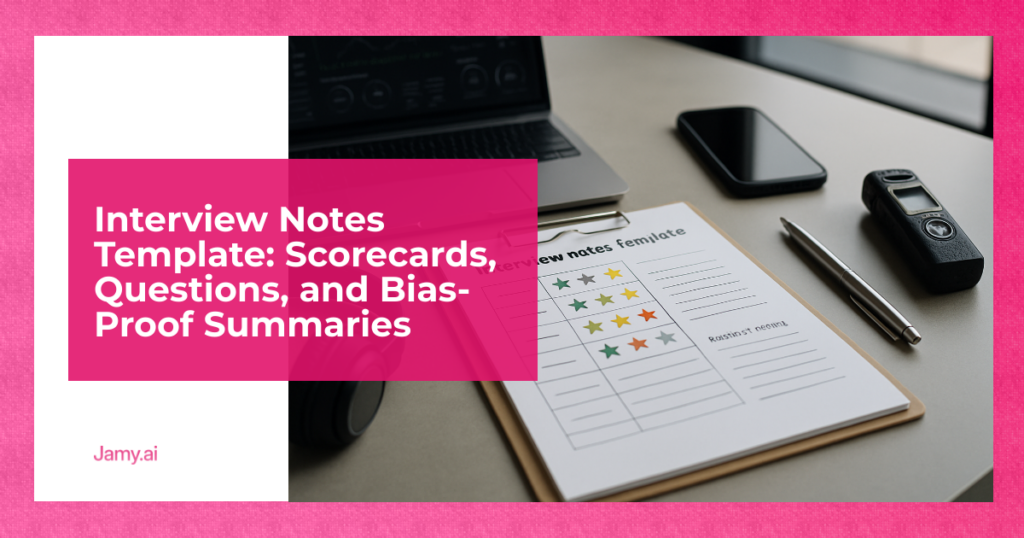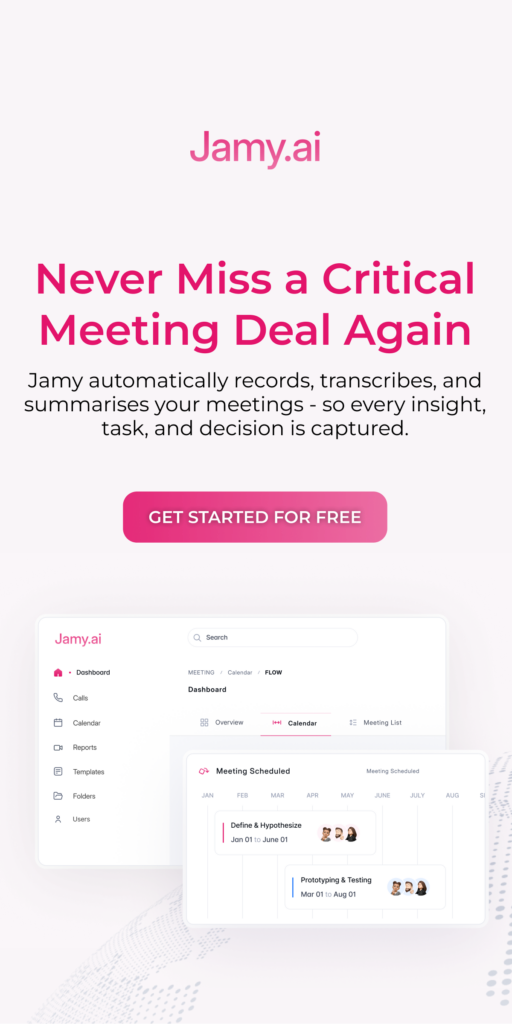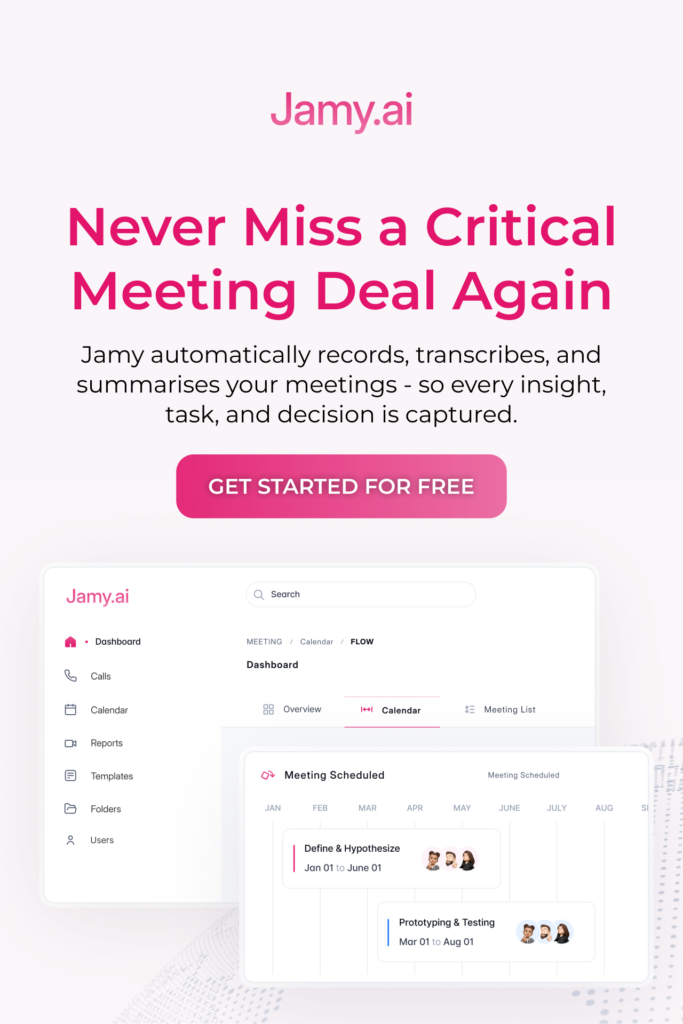Did you know that sales teams spend up to 70% of their time on administrative tasks instead of selling? Automating the update of your CRM after each call can save you time, eliminate errors, and improve the quality of your data.
Quick Summary:
-
Problem: Sales representatives spend weekly hours manually entering data into the CRM, leading to frustration, errors, and loss of revenue.
-
Solution: AI-driven automation that transcribes calls, updates data in real-time, and eliminates duplicates.
-
Benefits:
-
Up to 200 hours saved per user per year.
-
45% increase in sales revenue.
-
More accurate data, better segmentation, and compliance with GDPR.
-
-
How to get started: Integrate tools like Jamy with Zoho CRM using webhooks to automate key processes.
Why is it important?
Companies lose between 15% and 25% of their revenue due to inaccurate data. With an automated CRM, you can spend more time selling and less on repetitive tasks. Start today and transform your sales processes!
🔍 Zoho CRM with AI: How to AUTOMATE your sales? Discover ZIA


How Automation Solves CRM Problems
Automation, driven by AI, addresses the challenges that arise from manual data management in CRMs. Thanks to this technology, companies can increase their sales teams’ productivity by 34% and achieve 45% more sales revenue.
What AI-Driven CRM Automation Can Do
AI is completely changing how data is processed and managed in CRM systems. With automation, human errors are eliminated by automating tasks such as data entry, duplicate removal, information enrichment, real-time updates, and format standardization. For instance, automated systems can identify call participants, transcribe conversations, and extract key data such as raised issues, objections, and next steps. Additionally, algorithms can analyze information from various sources to enrich customer profiles with additional details about their demographics, preferences, and behaviors.
Another important benefit is AI’s ability to detect hidden patterns in data, enabling companies to better understand their customers and anticipate their needs. It also automates specific tasks such as contact management, lead tracking, email marketing, and integration with other tools. By applying consistent formats, automation facilitates both data integration and analysis, resulting in more agile and effective processes for sales teams.
Benefits of Automatic CRM Updates
CRM automation not only saves time but also improves the accuracy of the information stored. For example, it eliminates repetitive tasks and manual data entry, potentially saving each user up to 200 hours per year. This is especially noteworthy considering that more than 40% of workers spend at least a quarter of their workday on these manual tasks.
Real-time updates are another strong point of automation. They ensure that CRM data is always current, avoiding duplicates and immediately recording significant changes such as new job titles or issues detected during calls. Without this automation, CRM data can deteriorate rapidly; it is estimated that up to 30% of contact information becomes obsolete each year. Additionally, automated tools automatically qualify sales opportunities and update key fields, ensuring that the CRM always reflects the most relevant and complete information.
Automation also improves CRM hygiene, translating into more efficient sales processes. Incorrect data can cost companies up to 12% of their annual revenue. In the United States, for example, losses from inaccurate information reach approximately 2.8 trillion euros per year. By ensuring accurate and timely updates, automation eliminates these risks, allowing companies to focus on what really matters: closing more sales and strengthening relationships with customers.
How to Set Up Jamy for Integration with Zoho CRM

Connecting Jamy with Zoho CRM is not complicated, but it does require some preliminary steps. Currently, this integration works through webhooks, allowing real-time data transfer between both platforms.
Prepare Zoho CRM for Integration
First, you need to register your application in the Zoho Developer Console. This step is essential to obtain the Client ID and Client Secret, which are necessary for making API calls. Keep in mind that these features are available only if you have a subscription to Zoho CRM on the Professional plan or higher.
Once you have Zoho CRM set up, you will be ready to connect Jamy.
Connect Jamy to Zoho CRM
Before you begin, make sure your Jamy plan includes integrations. These are available in the Pro and Premium plans, priced at €29 and €39 per month respectively (billed annually). Then, generate an API key from your account settings in Jamy.
The connection is made using webhooks, which allow for real-time data sending from Jamy to Zoho CRM. If you need help configuring them, you can contact the support team by emailing [email protected].
The Jamy team can help you map call data to the corresponding fields in your Zoho CRM. This includes key information such as participant names, conversation summaries, identified tasks, and next steps.
Once the integration is set up, it is important to ensure everything is working correctly.
Test the Integration
Make a test call to verify that data, such as participants, summaries, tasks, and next steps, transfers correctly to the appropriate fields in Zoho CRM. If you notice any errors, contact technical support to adjust the webhooks.
The success of this integration relies on ongoing verification, especially during the first few weeks. It is advisable to regularly review your Zoho CRM after significant calls to ensure all relevant information is being recorded correctly. This will allow you to detect and resolve potential issues before they affect your workflow or sales processes.
How CRM Automation Improves Sales Processes
Automation in CRM systems not only saves time, but also transforms the way sales teams work. Currently, representatives spend only 30% of their time selling, while the rest is consumed by administrative tasks.
Measurable Impact of CRM Automation
Implementing an automated CRM has a direct effect on productivity and efficient time use. Companies that have adopted this technology have achieved remarkable results. One example is Holmes Murphy, an insurance brokerage that used CRM automation to analyze prospect behavior and personalize marketing campaigns. This approach saved them around 44,000 hours and generated an economic impact of $6.9 million.
Another notable case is that of RBC Wealth Management. Their advisors used to spend between 3 and 4 hours gathering information from 26 different systems before each meeting. With the integration of the CRM and legacy systems, they now have a consolidated view of each client. This not only provides them with relevant AI-driven insights but also significantly reduces the time spent on administrative tasks, allowing them to focus on business growth.
The numbers support this need: 45% of sales teams find administrative tasks to be their biggest challenge, and representatives spend 64% of their time on activities that are not directly related to sales. Furthermore, with the volume of customer data tripling in the last five years, maintaining accurate information without automated tools has become nearly impossible.
Best Practices for Sales Teams Using Automation
To make the most of an automated CRM, it is key to adopt well-thought-out strategies. According to Ciaran Connolly, Director of ProfileTree:
“Many companies rush into selecting a CRM without understanding their real requirements. We always recommend first mapping current sales processes, then identifying where automation can add genuine value instead of merely digitizing inefficient workflows.”
Connolly also emphasizes how proper implementation can be a game changer:
“The right CRM system transforms how companies approach customer relationships. We have seen companies from Northern Ireland double their lead conversion rates simply by implementing proper automation workflows and lead scoring systems.”
Effective sales teams focus on identifying repetitive tasks such as data entry, lead follow-up, and lead assignment to automate them. Additionally, they design workflows that not only optimize processes but also enhance the customer experience by maintaining personalized interactions.
The quality of data is also a fundamental pillar. Establishing clear guidelines for data entry and updates, maintaining consistent formats, and conducting regular clean-ups are essential practices, especially when nearly half of representatives deal with incomplete or inaccurate data.
Finally, training the team on how to use the automated CRM is essential. A well-implemented system, with access from mobile devices, allows for real-time data management from anywhere, creating a more agile and efficient sales environment.
Start Automating Your CRM with Jamy
Now that we have seen how automation can transform sales, it’s time to integrate this solution into your daily routine. Automating your CRM is not just an advantage; it is a necessity for sales teams to remain competitive—especially considering that representatives devote only 30% of their time to selling.
Why Automate Your CRM with Jamy?
CRM automation with Jamy not only improves productivity but also optimizes your team’s time and resources. Here are some key data points that demonstrate its impact:
-
A large part of the team’s time is wasted on manual tasks, directly affecting performance. An automated CRM can increase conversion rates by up to 300% and improve sales forecasting accuracy by 42%.
“CRM automation allows you to optimize necessary but repetitive manual tasks in marketing, sales, and customer service, giving your teams more time to focus on high-value work. By using AI to ease their burdens, you will create more effective and successful teams.”
Missy Roback, Award-Winning Writer and Editor
Moreover, integration with Zoho CRM removes obstacles and maximizes your team’s potential. According to data, 90% of representatives feel overwhelmed by repetitive tasks that could easily be automated.
How to Get Started with Jamy?
Ready to take advantage of these benefits? Implementing Jamy with Zoho CRM is a quick and easy process. With pricing designed to fit various needs, from €0.05 per minute processed to more complete enterprise plans, you can start noticing improvements immediately.
The Premium plan, for example, costs €39/month (billed annually) and includes full integration, custom templates, and dedicated support. This can translate into savings of up to 200 hours per year, along with more agile sales cycles.
70% of sales representatives rely on CRM solutions to close deals. With Jamy, tedious tasks disappear: it automatically records conversations, identifies participants, fills in fields in the CRM, and generates detailed summaries without manual intervention.
Setup takes just minutes, and results are seen quickly. In fact, teams that adopt CRM automation often experience a 40% increase in average purchase value.
And the best part: you don’t need a credit card to get started. Just connect your Zoho CRM account and watch how each call turns into useful, actionable data. It’s that simple!
FAQs
How can I ensure that the integration of Jamy with Zoho CRM works flawlessly from the start?
How to Ensure a Smooth Integration of Jamy with Zoho CRM
To ensure that the integration of Jamy with Zoho CRM works seamlessly from the start, follow these basic steps:
-
Connect both tools: Link Jamy with your Zoho CRM account using the detailed instructions in the integration guide. This is the first step for both platforms to work together effectively.
-
Adapt templates to your team: Modify call summary and note templates to fit your team’s specific needs. This will help ensure the recorded information is more relevant and useful.
-
Train your team: Make sure all team members know how calls are automatically recorded and how data is updated in the CRM. A brief training session can make a difference.
Additionally, it is a good idea to regularly review the generated logs to verify their accuracy. If you detect errors or inconsistencies, make the necessary adjustments. This will not only improve the effectiveness of the integration but also help your sales team get the most out of both tools.
What information can Jamy automatically update in the CRM after a call?
Jamy and Data Automation in Your CRM
Jamy automatically transcribes and updates key information in your CRM after each call. This includes participant data, conversation summaries, client needs and issues, raised objections, and pending follow-up tasks.
Moreover, Jamy automatically records details such as the date and time of the call (in dd/mm/yyyy format), its duration, and the results of the interaction. All of this ensures that your CRM is always up to date without having to dedicate time to manual updates. More efficiency and less effort!
How can Jamy improve the efficiency and revenue of my sales team when integrated with Zoho CRM?
Integrating Jamy with Zoho CRM allows sales teams to save time by automating routine tasks such as data entry and call summary creation. This means representatives can focus on what really matters: closing sales.
Automation not only lightens the administrative load but also improves the precision and consistency of data in the CRM. This facilitates more effective tracking of leads and opportunities. With more agile processes, your team will be better prepared to make informed decisions, optimize lead conversion, and consequently boost revenue.






